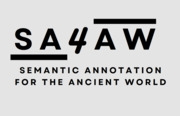 | SA4AW: Semantic Annotation for the Ancient World Gallos Campus, University of Crete, and online (Zoom) Rethymno, Crete, Greece, May 20-21, 2025 |
| Conference website | https://talos-ai4ssh.uoc.gr/semantic-annotation-for-the-ancient-world-conference/ |
| Submission link | https://easychair.org/conferences/?conf=sa4aw |
| Abstract registration deadline | February 15, 2025 |
| Submission deadline | February 15, 2025 |
This conference will explore the contribution of semantic annotation, along with that of hybrid AI, deep learning, and knowledge graphs to ancient world studies. Semantic annotation is the process of tagging or (manually or automatically) labelling pieces of content—such as words, phrases, or objects in texts or images—with meaningful metadata to provide context and clarify meaning. Semantic annotation allows machines to process the meaning and relationships of content within a dataset, transforming raw data into structured knowledge. For example, a machine can recognize that “Athens” is a city, distinguish it from the other cities with the same name, and link it to related concepts, which improves ability to perform tasks like searching, or making inferences. By tagging concepts, entities, and relations, semantic annotation enables machines to interpret and process data more accurately, connecting data points across software, allowing for better searchability, advanced queries and further reuse via natural language processing and machine learning.
Through this conference, we hope to foster collaboration and intellectual exchange amongst digital scholars of the ancient world. According to the principles of FAIR and Linked Open Data, we strive to promote openness and accessibility in all of the workflows and methods presented at the conference.
In order to further encourage the open exchange of ideas, the conference will also include a round-table discussion. We welcome accepted participants to suggest topics to discuss.
Conference proceedings will be published in open access online format.
We encourage proposals on the following themes:
- Ontology-driven semantic annotation
- Standardisation
- Multilingual annotation practices
- Automatic and semi-automatic annotation
- Annotation of ancient geography
- FAIR/LOD data
- Semantic Web
- NER for ancient Greek/Latin
- RDF-based digital editions
- Methods, tools, and platforms
Submission details:
We invite proposals from all scholars, junior and senior, working in the topic areas of the conference, for either papers or posters.
For papers:
- Please submit an abstract of max. 1,000 words (bibliography excluded, free format). Submissions will be reviewed via double-blind peer review.
- Paper presentations will be 20 minutes long, with extra time for questions and discussion. The working language of the conference is English.
- A longer version of accepted papers will be published in an edited volume after the conference. More details about the edited volume are forthcoming.
For posters:
- Authors are invited to submit an abstract of no more than 750 words, describing their research questions, motivation, and preliminary results.
- All formats are accepted. An image of the poster may also be included.
- Accepted posters will be published in the proceedings.
